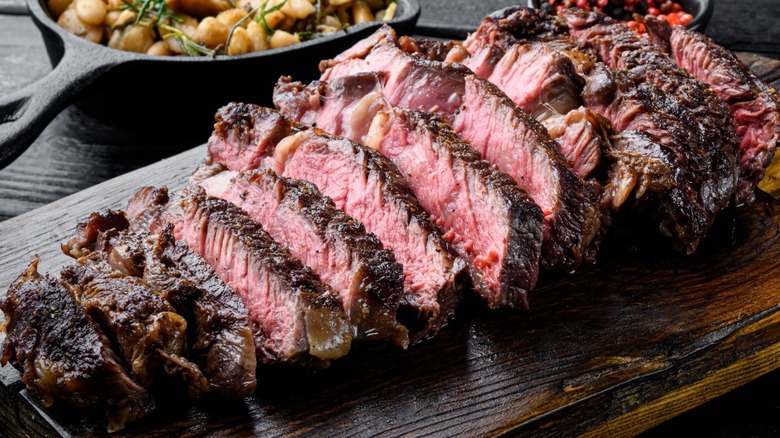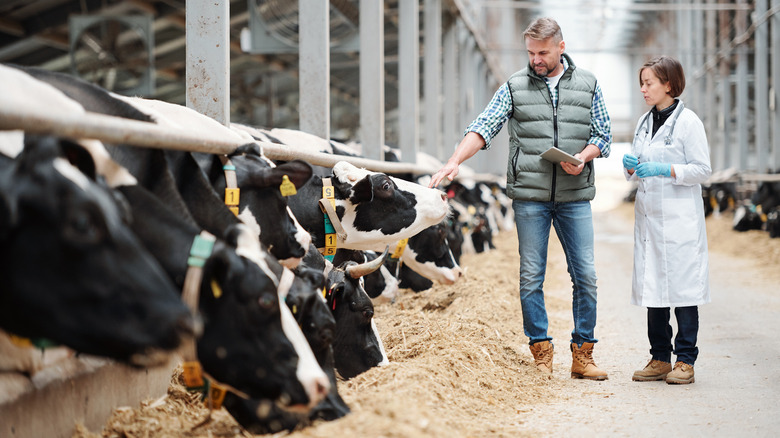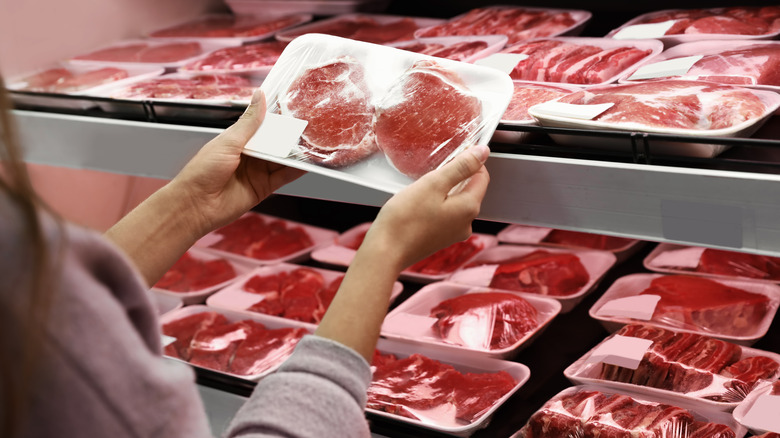Low Carbon Beef May Soon Be In Grocery Stores. Here's Why
Environmentally conscious meat-eaters may soon have the opportunity to purchase more sustainable beef products thanks to one company that's hoping to change the American cattle industry forever. The worldwide beef industry has long been a major contributor to global greenhouse gas emissions, which have resulted in global warming. According to BBC, beef produces the most greenhouse gas emissions of any type of livestock, with research from the University of California, Davis, indicating that a single cow releases 220 pounds of atmosphere-warming methane every year on average.
The cattle industry's massive greenhouse gas contributions have prompted some to call for a meat tax on products with a high emission rate. Individual companies have also taken steps to lower their beef-driven carbon footprint, such as Burger King, which put some of its livestock on a special diet of lemongrass to cause the cows to produce less methane during their digestion process (via CNN). Now, an Oklahoma-based certification company, Low Carbon Beef, is hoping to change the course of the cattle industry — one responsibly raised cow at a time. The company, which works with cattle ranches, family farms, feed yards, and beef packers to certify products made with reduced greenhouse gas emissions, recently got a huge stamp of approval from the USDA, according to its website.
This company works with farmers to certify sustainably raised cattle
In a press release, Low Carbon Beef announced that it had officially become a USDA Process Verified Program, which will potentially enable the company to add a Low Carbon Beef label to beef products sold at the grocery store — akin to a "grass fed" or "pasture raised" label — enabling consumers to make more conscious choices about their meat purchases. The newly certified beef must be produced with 10% fewer emissions than the cattle industry average and demonstrate "climate smart production practices," Low Carbon Beef founder Colin Beal told Food & Wine. "Ultimately USDA has the oversight to ensure that the claim is accurate and transparent to the buyer," he said.
Beal, who was raised in an Angus cattle-raising family and went on to receive his Ph.D. in engineering with a focus on alternative fuel production, founded the climate-conscious company in 2018 with a mission to disrupt the beef industry for the better, per Low Carbon Beef's website). The company, which will be the first to officially designate low carbon cattle sources (based on 20 criteria related to fertilizers, fuels, feeds, and more) is constantly seeking new farms, ranches, and other beef producers to work with to lower their overall emissions.
The new label will help consumers choose sustainably raised beef
"We need to do more than talk about change, we have to be able to measure it, verify it, and provide a better product for consumers," said Beal in a statement, adding that the Low Carbon Beef label will give farmers and producers of sustainable beef the chance to "validate" their practices. Moreover, the company's internal research indicates that 71 percent of consumers would be willing to pay more for certified sustainably raised beef. This suggests that the certified beef will likely come with a higher price tag than conventional beef.
The company's major stamp of approval from the USDA has the potential to change the way consumers, retailers, and restaurants purchase their meat by providing the public with a clear-cut sustainable choice when it comes to grocery shopping. In the future, Low Carbon Beef hopes to expand its certification and labeling system to recognize beef made with even larger emissions reductions in hopes of paving a path toward a more sustainable meat-eating future.


